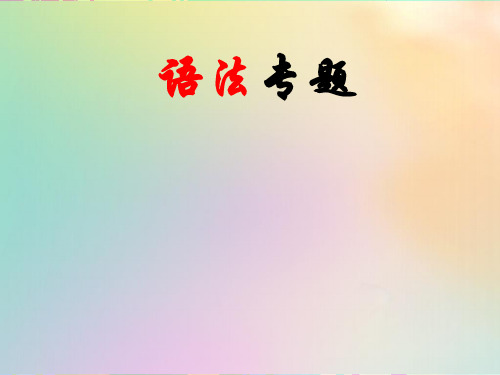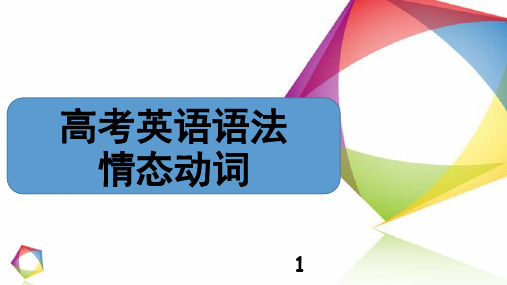最新整理高考情态动词讲解.ppt
合集下载
情态动词讲解ppt课件

A. may B. might C. could
D. must
10
may, might, can, could
表示猜测
➢ 1. They (can/might) ___m__ig_h__t___be away for the
weekend but I’m not sure.
表示许可
➢ 2. You (may/might) __m__a_y_____leave now if you
1.A computer ____ think for itself; it must be told what to do.
A. can’t B. couldn’t C. may not D. might not
1.I thought you ________ like something to read, so I have brought you some books.
2.表示推测时,could不是过去式,只是语气 更委婉;若是推测已发生的事或过去的情况, 用can/could have done
7
3.can和be able to辨析 can(could)和be able to都可以表示能力,意思上没有区别。 但can只有现在式和过去式,而be able to则有更多的形式。 如:
3
Ⅲ 情态动词的语法特征 1) 情态动词不能表示正在发生或已经
发生的事情,只表示期待或估计某事的 发生。
2) 情态动词除ought 和have 外,后 面只能接动词原形。
3) 情态动词没有人称,数的变化,即 情态动词第三人称单数不加-s。
4) 情态动词没有非谓语形式,即没有 不定式,分词,等形式。
1.It may rain this afternoon. 2.She might come to join us this afternoon. 3.I suppose he might have missed the train.
情态动词全部ppt课件

16
Some festivals are held to satisfy the ancestors, who might return either to help or to do harm.
推测
17
--- Excuse me. Is this the right way to the Summer Palace?
3. will/would
1. 表示意愿,will表示现在的意愿, would表示过去的意愿。
I will stick to my plan though all of you are against it.
I told him to give up smoking, but he wouldn’t
3. During the vacation, he would visit me
every four days.
过去的习惯
4. Will / Would you pass me the ball,
please?
请求
习惯,倾向 5. Birds will fly to the south in the winter. 24
You can go with them if you like.
--- Could/Can I have a look at your new design? --- Yes, of course you can.
(注意此处答语不能用could)
8
3)用在肯定句中,表示_客__观__上__有__可_ 能 Anybody can make mistakes. Driving on the snowy roads can be very dangerous.
Some festivals are held to satisfy the ancestors, who might return either to help or to do harm.
推测
17
--- Excuse me. Is this the right way to the Summer Palace?
3. will/would
1. 表示意愿,will表示现在的意愿, would表示过去的意愿。
I will stick to my plan though all of you are against it.
I told him to give up smoking, but he wouldn’t
3. During the vacation, he would visit me
every four days.
过去的习惯
4. Will / Would you pass me the ball,
please?
请求
习惯,倾向 5. Birds will fly to the south in the winter. 24
You can go with them if you like.
--- Could/Can I have a look at your new design? --- Yes, of course you can.
(注意此处答语不能用could)
8
3)用在肯定句中,表示_客__观__上__有__可_ 能 Anybody can make mistakes. Driving on the snowy roads can be very dangerous.
【高中语法复习】情态动词(共48张PPT)

need to do
need do
Need 的回答
Need I come here tomorrow ? Yes, you must.
No, you needn’t. / you don’t have to.
Johnny, you ____ play with the knife, or you ____ hurt yourself.
猜测
--Oh my god ! Can it be true ? --It can’t be ture.
常用词组积累 can not/ never…too; can’t…enough
can’t help doing
无论怎么…都不过分 禁不住;不由得
I could have worked out the question, but I was too nervous.(过去有能力做但未做)
I must take care of my hairstyle.
must 的回答
-不用mustn’t回答-
Must I go to school today?
Yes,you must !
No, you don’t have to. /needn’t. /had better not.
You mustn’t bully your brother. He must have seen the answer.
时态 单复数 肯定变否定
提问
3
情感和态度
can
could may
might must should
情态动词 情态实意
must, can, could, may, might, ought stohall, should, will, would
need do
Need 的回答
Need I come here tomorrow ? Yes, you must.
No, you needn’t. / you don’t have to.
Johnny, you ____ play with the knife, or you ____ hurt yourself.
猜测
--Oh my god ! Can it be true ? --It can’t be ture.
常用词组积累 can not/ never…too; can’t…enough
can’t help doing
无论怎么…都不过分 禁不住;不由得
I could have worked out the question, but I was too nervous.(过去有能力做但未做)
I must take care of my hairstyle.
must 的回答
-不用mustn’t回答-
Must I go to school today?
Yes,you must !
No, you don’t have to. /needn’t. /had better not.
You mustn’t bully your brother. He must have seen the answer.
时态 单复数 肯定变否定
提问
3
情感和态度
can
could may
might must should
情态动词 情态实意
must, can, could, may, might, ought stohall, should, will, would
情态动词讲解精ppt课件

例句
will/would
详细描述:will 表示现在的意愿或 预测,would 表示过去的或虚拟 的意愿或预测。
1. I will help you with your project.(我会帮助你完成你的项 目。)
总结词:表示意愿或预测
例句
2. They would have gone to the party if they had known about it earlier.(如果他们早点 知道,他们就会去参加聚会。)
表示意愿
情态动词+动词原形,如 would like to go,表示 某人想要去。
形式变化
基本形式
情态动词的基本形式包括 现在时、过去时和将来时 。
过去式
情态动词的过去式通常是 在基本形式后面加-d或ed,如could have done 、should have done等。
将来时
情态动词的将来时通常是 在基本形式后面加-will或shall,如will be able to 、shall have to等。
may与might的区别与联系
总结词
may表示现在的许可或可能性;might表示过去的可能性或许可。
详细描述
may用于肯定句中,表示许可或可能性,例如“You may use this room.”(你可以使用这个房间。 )“The book may be in the library.”(这本书可能在图书馆里。)might表示过去的可能性,常 用于过去时态的句子中,例如“He might come tomorrow.”(他明天可能来。)
未必、很难说
She might not agree with us.
表示虚拟语气
will/would
详细描述:will 表示现在的意愿或 预测,would 表示过去的或虚拟 的意愿或预测。
1. I will help you with your project.(我会帮助你完成你的项 目。)
总结词:表示意愿或预测
例句
2. They would have gone to the party if they had known about it earlier.(如果他们早点 知道,他们就会去参加聚会。)
表示意愿
情态动词+动词原形,如 would like to go,表示 某人想要去。
形式变化
基本形式
情态动词的基本形式包括 现在时、过去时和将来时 。
过去式
情态动词的过去式通常是 在基本形式后面加-d或ed,如could have done 、should have done等。
将来时
情态动词的将来时通常是 在基本形式后面加-will或shall,如will be able to 、shall have to等。
may与might的区别与联系
总结词
may表示现在的许可或可能性;might表示过去的可能性或许可。
详细描述
may用于肯定句中,表示许可或可能性,例如“You may use this room.”(你可以使用这个房间。 )“The book may be in the library.”(这本书可能在图书馆里。)might表示过去的可能性,常 用于过去时态的句子中,例如“He might come tomorrow.”(他明天可能来。)
未必、很难说
She might not agree with us.
表示虚拟语气
《高中情态动词》课件

常用情态动词:need to
情态动词need to表示需要和必须。它常用于表示某人需要做某事或某事必须 发生的情况。
常用情态动词:have to
情态动词have to表示必须和不得不。它常用于表示某事必须发生,或者表示强奸的义务和责任。
常用情态动词:dare to
情态动词dare to表示敢于、冒险和挑战。它常用于表示敢于做某事或挑战某种观念或权威。
常见用法和例
表达能力
He can swim across the rivmorrow.
提出建议
You should study harder for the exam.
表达许可
Can I go to the party?
表示义务
I must finish my homework before I can watch TV.
常用情态动词:could
情态动词could用于表示过去的能力、许可和可能性。它可以表达过去某一时刻的能力和可能性,也可 以用于客气地请求许可。
常用情态动词:may
情态动词may表示许可、可能性和推测。它常用于礼貌地请求许可,也可以表示某事可能发生或猜测。
常用情态动词:might
情态动词might用于表示可能性、推测和建议。它常用于表示某事可能发生或猜测,也可以用于委婉地 提出建议。
情态动词的种类和区别
常见的情态动词包括can、could、may、might、will、would、should、must、 shall、ought to、need to和have to等。每个情态动词都有自己独特的用法和 意义,需要根据具体语境来理解和运用。
常用情态动词:can
情态动词can表示能力、许可和可能性。它常用于表达一个人有能力做某事, 或某事可能发生的情况。
高考英语语法——情态动词(共29张PPT)

I would rather have told it to her.
17
ought to
表示理应做的事,应该做的事,意为“应该、应当”。 She ought to put more energy into her study. He oughtn't to look down upon the poor. 表示推测,意为“应是,应该,会是”。 What she said ought to be true.
Can the answer be right?
He can't/couldn't have turned off the light.
There can't be any person beyond law in China.
He could have passed the driving test.
He used to live there, usedn't/didn't he?
used to说明过去存在而现在已经不在了;而would则与现在没有 联系,过去发生的动作有可能仍然存在,也有可能已不存在。
He used to be a heavy-smoker but he has got rid of the bad
2
表示“许可”,这种用法相当于may,could语气比can更加委婉。
You can help yourself at my home.
You could contact us in order to book a room.
表示可能性,常用于疑问句和否定句中,表示“有可能或绝对不可能”; 在肯定句中要用may或must。
高考英语语法 情态动词
1
17
ought to
表示理应做的事,应该做的事,意为“应该、应当”。 She ought to put more energy into her study. He oughtn't to look down upon the poor. 表示推测,意为“应是,应该,会是”。 What she said ought to be true.
Can the answer be right?
He can't/couldn't have turned off the light.
There can't be any person beyond law in China.
He could have passed the driving test.
He used to live there, usedn't/didn't he?
used to说明过去存在而现在已经不在了;而would则与现在没有 联系,过去发生的动作有可能仍然存在,也有可能已不存在。
He used to be a heavy-smoker but he has got rid of the bad
2
表示“许可”,这种用法相当于may,could语气比can更加委婉。
You can help yourself at my home.
You could contact us in order to book a room.
表示可能性,常用于疑问句和否定句中,表示“有可能或绝对不可能”; 在肯定句中要用may或must。
高考英语语法 情态动词
1
《情态动词讲解》课件

1
表示能力和可能性
这一用法涉及到情态动词在表示一个
表示推测和推断
2
人或事物的能力或可能性方面的应用。
情态动词还可用来表示具有推测性质
的情况和推断。
3
表示义务和建议
情态动词可用于表示某人应该或必须
表示意愿和打算
4
做的事情,或者提出建议。
用情态动词来表达某人的意愿或打算 进行的行为。
情态动词的否定和疑问
3 同时使用情态动词和实义动词时的注意事项
了解使用情态动词和实义动词时需要注意的细节。
总结
情态动词的重要性
深入理解情态动词的重要性,以及它们在语言中 的作用。
情态动词的学习方法
提供一些有效的学习方法,帮助您更好地掌握情 态动词的用法。
参考资料
书籍推荐
推荐一些深入学习情态动词的相关书籍。
网站推荐
建议一些在线资源,以便进一步学习和练习 情态动词。
2 may/might
表示推测和推断的情态 动词。
3 shall/should
表示义务和建议的情态 动词。
4 will/would
表示意愿和打算的情态动词。
5 must
表示必须和必然的情态动词。
情态动词的用法
情态动词有多种用法,我们将详细讨论其中的一些,包括表示能力和可能性、推测和推断、义务和建 议,以及意愿和打算。
特点
情态动词具有几个典型的特点,例如它们没有人称和数的变化,并且后面跟原形动词。
情态动词的种类
情态动词有几种常见的类型,我们将深入讨论其中的几个种类,包括can/could、may/might、 shall/should、will/would以及must。
1 can/could
情态动词(共43张PPT)

A.Must; mustn't
B.Will; couldn't
C.May; can't
( C ) It's really hot in the room.You'd better
the
windows. A.not to close B.don't close C.not close
(B )
—You
drive after drinking, Simon.
—You're right.I'll take a taxi.
A.wouldn't B.shouldn't C.ought to
二、用恰当的情态动词填空。
Simon, you mmuussttnn''tt play with the knife.You mmayay
在回答以 may 提问的问句时,肯定回答一般可仍用 may 或 Yes, please./Certainly./Sure./Of course.否定回答根据说话人的语气 由强到弱分别选用: mustn't/can't/may not。 —May I watch TV? 我能看电视吗? —No, you mustn't.You must play the piano first.不,你禁止看, 你必须先弹钢琴。
need 的基本用法 意为“需要;必要”,作情态动词时常用于否定句和疑问句中。 You needn't hand in your homework tomorrow.你明天不需要 交你的作业。 Need I attend the meeting this afternoon? 我需要今天下午参 加会议吗?
高考语法专题复习 情态动词(共16张PPT)

= He managed to flee ( succeeded in fleeing ) Europe before the war broke out.
常见辨析2: must与have to
熟 读 深
years old. Lucy also keeps taking exercise every day. She says that she has表to不[得3]不do some sports because she mu表st必[4须] keep slim. “You sha表ll[告5诫] get fat soon if you don’t take exercise every day.”
in bold to the usages on learning material Lucy is an outgoing lady. She can表[1能]力play
many kinds of musical instruments. Actually,
she cou表ld能[2力]play the piano when she was 8
思 she usually says to her friends.
As for her, an elegant lady shoul表d[应6]该try to keep fit. However, last week, she found that she
migh表t[可7能] put on weight and she was worried
Q2: What can we do to show our true love to our beloved parents and respectable teachers?
常见辨析2: must与have to
熟 读 深
years old. Lucy also keeps taking exercise every day. She says that she has表to不[得3]不do some sports because she mu表st必[4须] keep slim. “You sha表ll[告5诫] get fat soon if you don’t take exercise every day.”
in bold to the usages on learning material Lucy is an outgoing lady. She can表[1能]力play
many kinds of musical instruments. Actually,
she cou表ld能[2力]play the piano when she was 8
思 she usually says to her friends.
As for her, an elegant lady shoul表d[应6]该try to keep fit. However, last week, she found that she
migh表t[可7能] put on weight and she was worried
Q2: What can we do to show our true love to our beloved parents and respectable teachers?
高考情态动词考点ppt课件

I must go to the bank and get some money. Cars mustn’t park in front of the entrance.
2. 在以must 开头的疑问句中,肯定回答用must; 否 定回答用needn’t 或don’t have
—Must we hand in our exercise books now?
1. used to表示过去的习惯动作或状态(现已不复存在) He told us he used to play football when he was young.
疑问句: Did you use to go there? / Used you to go there? 否定句: I didn’t use to go there. / I usedn’t to go there. 反意疑问句或简略回答: She used to be very fat, didn’t she?
What shall we do this weekend?
3. shall 常用于主语是第三人称的条约、法律法规、规 章制度等文件中表“义务”或“规定”
One of our rules is that every student shall wear school uniform while at school.
.
10
(六)should
1. 表义务, 意为“应该”(某件事宜做),用于各种人称。 You should be polite to your teachers. You shouldn’t waste any time.
2. 表推测,意为“想必一定、照说应该、估计”等。 The film should be very good as it is starring first-class actors. They should be home by now.
2. 在以must 开头的疑问句中,肯定回答用must; 否 定回答用needn’t 或don’t have
—Must we hand in our exercise books now?
1. used to表示过去的习惯动作或状态(现已不复存在) He told us he used to play football when he was young.
疑问句: Did you use to go there? / Used you to go there? 否定句: I didn’t use to go there. / I usedn’t to go there. 反意疑问句或简略回答: She used to be very fat, didn’t she?
What shall we do this weekend?
3. shall 常用于主语是第三人称的条约、法律法规、规 章制度等文件中表“义务”或“规定”
One of our rules is that every student shall wear school uniform while at school.
.
10
(六)should
1. 表义务, 意为“应该”(某件事宜做),用于各种人称。 You should be polite to your teachers. You shouldn’t waste any time.
2. 表推测,意为“想必一定、照说应该、估计”等。 The film should be very good as it is starring first-class actors. They should be home by now.
高三英语新高考复习ppt情态动词课件名师课件

I'll support you if you dare do it. 如果你敢做,我就支持你。(敢)
【 最名 新校 版课 本堂 说】课获稿奖高P三PT英-高语三新英高语考新复高习p考pt复情习态课动件词第课七件章名情师态p动pt词课 课件件((优 最选新)版 本)推 荐
【 最名 新校 版课 本堂 说】课获稿奖高P三PT英-高语三新英高语考新复高习p考pt复情习态课动件词第课七件章名情师态p动pt词课 课件件((优 最选新)版 本)推 荐
第七章 情态动词
Байду номын сангаас
知识梳理
最新版本说课稿高三英语新高考复习p pt情态 动词课 件名师 ppt课 件(优 选)
一、概念及分类 1. 情态动词+动词原形 情态动词表示说话人对有关行为或事物的态度及看法, 认为其可能、 应该或必要等, 不能单独作谓语, 只能和其他动词原形一起作谓语。 2. 情态动词有四类 ①只作情态动词: must, can(could), may(might), ought to ②可作情态动词, 又可作实义动词: need, dare ③可作情态动词, 又可作助动词: shall(should), will(would)
【 最名 新校 版课 本堂 说】课获稿奖高P三PT英-高语三新英高语考新复高习p考pt复情习态课动件词第课七件章名情师态p动pt词课 课件件((优 最选新)版 本)推 荐
【 最名 新校 版课 本堂 说】课获稿奖高P三PT英-高语三新英高语考新复高习p考pt复情习态课动件词第课七件章名情师态p动pt词课 课件件((优 最选新)版 本)推 荐
You must be here at 7: 30 tomorrow morning. 你明天早上七点半必须到达这里。(必须) I will do anything for our soldiers. 我愿意为我们的战士做任何事。(愿意) You should be responsible for yourself. 你应该对你自己负责。(应该) Need he do it all at once? 他需要马上做这件事吗?(需要)
【 最名 新校 版课 本堂 说】课获稿奖高P三PT英-高语三新英高语考新复高习p考pt复情习态课动件词第课七件章名情师态p动pt词课 课件件((优 最选新)版 本)推 荐
【 最名 新校 版课 本堂 说】课获稿奖高P三PT英-高语三新英高语考新复高习p考pt复情习态课动件词第课七件章名情师态p动pt词课 课件件((优 最选新)版 本)推 荐
第七章 情态动词
Байду номын сангаас
知识梳理
最新版本说课稿高三英语新高考复习p pt情态 动词课 件名师 ppt课 件(优 选)
一、概念及分类 1. 情态动词+动词原形 情态动词表示说话人对有关行为或事物的态度及看法, 认为其可能、 应该或必要等, 不能单独作谓语, 只能和其他动词原形一起作谓语。 2. 情态动词有四类 ①只作情态动词: must, can(could), may(might), ought to ②可作情态动词, 又可作实义动词: need, dare ③可作情态动词, 又可作助动词: shall(should), will(would)
【 最名 新校 版课 本堂 说】课获稿奖高P三PT英-高语三新英高语考新复高习p考pt复情习态课动件词第课七件章名情师态p动pt词课 课件件((优 最选新)版 本)推 荐
【 最名 新校 版课 本堂 说】课获稿奖高P三PT英-高语三新英高语考新复高习p考pt复情习态课动件词第课七件章名情师态p动pt词课 课件件((优 最选新)版 本)推 荐
You must be here at 7: 30 tomorrow morning. 你明天早上七点半必须到达这里。(必须) I will do anything for our soldiers. 我愿意为我们的战士做任何事。(愿意) You should be responsible for yourself. 你应该对你自己负责。(应该) Need he do it all at once? 他需要马上做这件事吗?(需要)
- 1、下载文档前请自行甄别文档内容的完整性,平台不提供额外的编辑、内容补充、找答案等附加服务。
- 2、"仅部分预览"的文档,不可在线预览部分如存在完整性等问题,可反馈申请退款(可完整预览的文档不适用该条件!)。
- 3、如文档侵犯您的权益,请联系客服反馈,我们会尽快为您处理(人工客服工作时间:9:00-18:30)。
no one, nobody连用; dare 3.常以needn’t 和
daren’t
done (sth.) need doing
的4.d形a式re出有现其;过去时dared.
判断正误: How dare you say such a thing?
How dare you to say such a thing?
表示推测——情态动词的重要用法.
情态动词
对将来
肯定的推测
+ V.
must 常见must be
对现在
对过去
+ V.
+ have done
+ be doing
可能的推测
may, might
否定的推测
can’t, couldn’t
疑问的推测
can, could
+ V.
+ V.
+ have done
+ be doing
1.--Is John coming by train?
--He should, but he ____ not. He likes driving
his car.
ቤተ መጻሕፍቲ ባይዱ
(2002高考题)
A. must B. can C. need D. may
2.It has been announced that candidates(候选人)
No, ____yo__u_n_e_e_d_n_’_t___. No, __y_o_u_d_o_n_’_t_h_a_v_e__to_.
needn’t 对其它情态动词的回答:
--Shall I tell John about it? --No, you __n_e_e_d_n_’_t__.
(don’t have to)
可以用not表示“可能不”
+V.
+ V.
+ have done
+ be doing
+ V.
+ V.
+ have done
+ be doing
1. I don't know where she is, she __m_a_y___ be in Wuhan. 2. At this moment, our teacher _m__u_st__b_e_m__a_r_k_in_g__ our exam papers. 这时,我们老师想必在批改试卷。 3. The road is wet. It _m__u_s_t _h_a_v_e_r_a_i_n_e_d_ last night.
情态动词
表示推测 不表示推测
I daren’t ask her for a rise. 我不敢请求她加薪. How did you dare to tell her that? I wonder whether he dare stand up in public. I don’t know how she dares to wear that dress. Do you need any help? I wonder whether he need send it immediately. I need hardly tell you that the work is dangerous. The garden doesn’t need watering at the moment. You needn’t finish that work today.
可兼做行为动词的情态动词:need 、 dare
情态动词 (+动词原形)
行为动词
1.无人称和数的变化; need 2.尤其用于:
*否定句及疑问句中;
多用于肯定句;
(sb.) need to do
*在if/whether之后; .
dare to do
*或与hardly, never, (sth.) need to be
____ remain in their seats until all the papers
have been collected.
(2002上海高考题)
A. can B.will C. may D. shall
3.--I heard they went skiing in the mountains last
winter.
(2002北京高考题)
--It ____ true because there was little snow there.
A. may not be
B. won’t be
C. couldn’t be
D. mustn’t be
can could may might shall should must will would ought to have to dare (daren’t) need (needn’t) used to
He daren’t to speak English before such a crowd, did he?
He daren’t speak English before such a crowd, dare he?
Nobody need to be afraid of catching the disease. Nobody need be afraid of catching the disease.
These dishes need be cleaned carefully. These dishes need to be cleaned carefully. These dishes need cleaning carefully.
注意对need问句的回答:
--Need I finish the work today? --Yes, ____y_o_u_m__u_s_t_____.
--Must we do it now? --No, you __n_e_e_d_n_’_t__.
(don’t have to)
表示推测——情态动词的重要用法.
1. You must be Mr Smith----I was told to expect you here.
2. He must have known what we wanted. 3. We may have read the same report. 4. He can’t have slept through all that noise. 5. There’s someone outside----who can it be? 6. What can they be doing? 7. These pills might help to cure your disease. 8. You could be right, I suppose.
